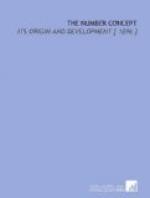Deep regret must be felt by every student of philology, that the primitive meanings of simple numerals have been so generally lost. But, just as the pebble on the beach has been worn and rounded by the beating of the waves and by other pebbles, until no trace of its original form is left, and until we can say of it now only that it is quartz, or that it is diorite, so too the numerals of many languages have suffered from the attrition of the ages, until all semblance of their origin has been lost, and we can say of them only that they are numerals. Beyond a certain point we can carry the study neither of number nor of number words. At that point both the mathematician and the philologist must pause, and leave everything beyond to the speculations of those who delight in nothing else so much as in pure theory.
THE END.
INDEX OF AUTHORS.
Adam, L., 44, 159, 166, 175.
Armstrong, R.A., 180.
Aymonier, A., 156.
Bachofen, J.J., 131.
Balbi, A., 151.
Bancroft, H.H., 29, 47, 89, 93, 113, 199.
Barlow, H., 108.
Beauregard, O., 45, 83, 152.
Bellamy, E.W., 9.
Boas, F., 30, 45, 46, 65, 87, 88, 136, 163, 164, 171,
197, 198.
Bonwick, J., 24, 27, 107, 108.
Brinton, D.G., 2, 22, 46, 52, 57, 61, 111, 112, 140,
199, 200.
Burton, R.F., 37, 71.
Chamberlain, A.F., 45, 65, 93.
Chase, P.E., 99.
Clarke, H., 113.
Codrington, R.H., 16, 95, 96, 136, 138, 145, 153,
154.
Crawfurd, J., 89, 93, 130.
Curr, E.M., 24-27, 104, 107-110, 112.
Cushing, F.H., 13, 48.




